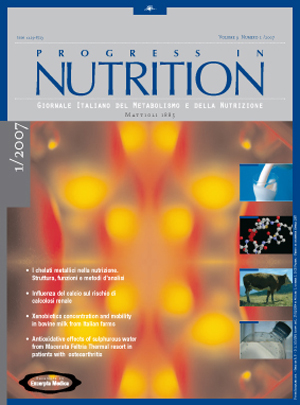Baseline respiratory quotient predicts weight change in overweight and obese young women
Keywords:
Respiratory quotient, resting energy expenditure, weight gain, indirect calorimetryAbstract
Background/Aims: The identification of behavioural and metabolic risk factors of weight gain is a continuous challenge. This study wants to assess the predictive value of non-protein respiratory quotient (NPRQ) and resting energy expenditure (REE) on changes of body weight after a 3 years follow-up in overweight and obese young women. Methods: Thirty-four women of age 25.7±5.8 years and BMI of 31.06±3.72, which were measured weight, height, body composition, resting energy expenditure and nonproteic respiratory quotient, started a weight loss programme and they attended individual, monthly follow-up visits for an average time of 7 months. After 36 months from baseline, subjects were contacted and invited to the clinic for a set of new measurements. Results: After 36 months weight change (weight loss) was 3.08±9.8 kg. The NPRQ showed a significant increase at the follow up (p<0.05). Change (D) in body weight (BW) was significantly correlated with DNPRQ (p<0.01) and DREE (p<0.001). The multiple regression analysis showed that DBW was predicted by baseline NPRQ and high baseline values were associated with weight gain after 36 months. Conclusion: Baseline NPRQ was a significant predictor of weight change in overweight young women.
Downloads
Published
Issue
Section
License
This is an Open Access article distributed under the terms of the Creative Commons Attribution License (https://creativecommons.org/licenses/by-nc/4.0) which permits unrestricted use, distribution, and reproduction in any medium, provided the original work is properly cited.
Transfer of Copyright and Permission to Reproduce Parts of Published Papers.
Authors retain the copyright for their published work. No formal permission will be required to reproduce parts (tables or illustrations) of published papers, provided the source is quoted appropriately and reproduction has no commercial intent. Reproductions with commercial intent will require written permission and payment of royalties.

This work is licensed under a Creative Commons Attribution-NonCommercial 4.0 International License.


